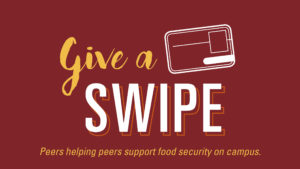Give a Swipe


What is the Give a Swipe Program?
The Give a Swipe program gives you the ability to help support food security on campus. You can donate Flex Meals or Dining Dollars to other students in need of meal assistance due to hardship. Your donations will turn into meal swipes that can be used in any dining center.
We have partnered with other departments on campus, (Office of Student Assistance, Student Wellness, Financial Aid, International Students & Scholars, and Student Counseling Services) to help identify students in need to receive these meals. The meals donated during donation week will be available all semester long.
What is Food Insecurity?
Food insecurity is “is one way we can measure and assess the risk of hunger.” According to Feeding America, one in nine Iowans are food insecure. The United Way of Story County reports that 15.5% of Story County residents report being food insecure.
Food insecurity can affect students in a number of ways: It can cause serious health issues, lead to financial hardships (having to pay a bill versus eating dinner) and hamper the student’s learning ability.
Are College Students Really Food Insecure?
The short answer is, yes. In the 2017 ISU Campus Climate survey, it was found that 40% of the students who completed the survey struggled to provide food for themselves. In other research, 35-40% of college students nationwide report they have experienced food insecurity during their college career. Across the country, 1 in 7 students regularly skip meals because of money/financial burden.
Donate Swipes
Any student with a meal plan can donate swipes during the scheduled donation period. The maximum allowable donation includes two Flex Meals (Campanile and Meal Block Plans), two dining center swipes (Gold Plan), two guest swipes (Cardinal Plan), or the equivalent of $16 in Dining Dollars.
How to Receive Meals
If you are a student that needs to access these emergency meals, please reach out to any of the following partners of the Give A Swipe program.
- Office of Student Assistance-Phone: 515-294-1020 Email:studentassistance@iastate.edu
- Student Wellness-Phone: 515-294-1099 Email:studentwellness@iastate.edu
- Financial Aid-Phone:515-294-2223 Email:financialaid@iastate.edu
- International Students & Scholars-Phone:515-294-1120 Email:isso@iastate.edu
- Student Counseling Services-Phone:515-294-5056
Other Campus and Community Resources That Support Food Access:
- Student Wellness Food Insecurity
- Food at First – Daily free meal and food market.
- The SHOP – Confidential campus food pantry.
- ISU Extension Spend Smart Eat Smart
- Bethesda Food Pantry


